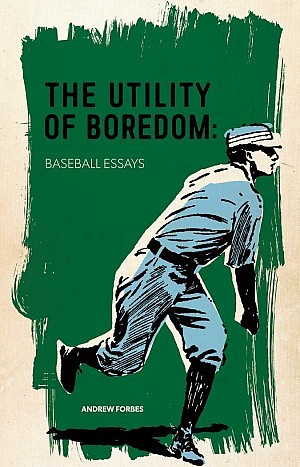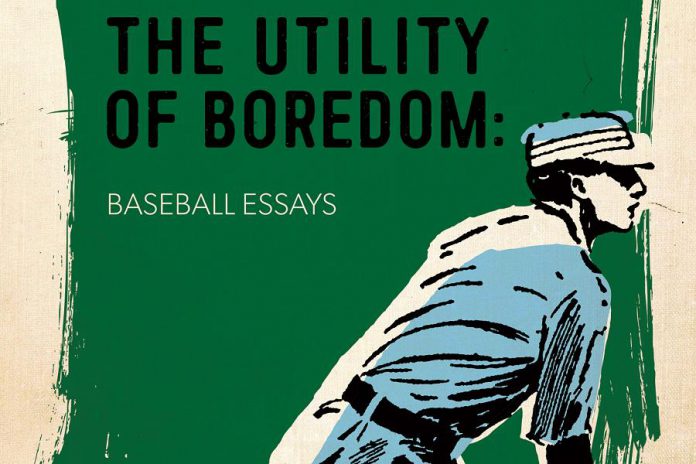Born in Ottawa where he attended Carleton University, Andrew Forbes lives in Peterborough. He has written film and music criticism, liner notes, sports columns, and short fiction.

He is the author of What You Need, a collection of fiction, and The Utility of Boredom: Baseball Essays (both available from Invisible Publishing).
The Utility of Boredom: Baseball Essays (Invisible Publishing, April 4, 2016) is available at Chapters Indigo, Amazon, iBooks, All Lit Up, direct from the publisher, and most independent booksellers.
Andrew will be launching The Utility of Boredom in Peterborough at The Garnet (231 Hunter St. W., Peterborough) from 7 to 9:30 p.m. on Friday, April 22, 2016. Authors Brent van Staalduinen, Teri Vlassopolous, and Janette Platana will also be doing readings from their books.
Also at The Garnet on Friday, May 13, 2016 from 8 to 10:30 p.m., Andrew will be participating in “Designated Hitters: Bad Men, Boogeymen, and Baseball” with Andrew F. Sullivan and Ian Rogers. For more information on Andrew Forbes, visit his website at www.andrewgforbes.com.
“The Utility of Boredom” – excerpted from The Utility of Boredom: Baseball Essays by Andrew Forbes (Invisible Publishing, 2016)

Modern televised baseball is a marvel, crystal clear and stacked with reams of information, and I don’t take it for granted. But it can also be overwhelming. Radio broadcasts, on the other hand, are unfailingly comforting.
There used to be an element of providence involved in picking up a game on the radio; a small joy that registered when a signal drifted across the Great Lakes intact or bounced at just the right angle off the troposphere and came in — hallelujah! — clear as day. There was something viscerally satisfying about knowing where in your house to prop a radio or where to pilot your sedan, to which hills, in order to ensure the best reception. Sometimes, on summer nights, I’d drive my old Saturn down the highways of Eastern Ontario and when I let the dial scan it would pick up not just Blue Jays games but broadcasts from New York, Pittsburgh, Philadelphia, Cleveland. We’ve traded all that for the ability, provided we’ve ponied up the subscription fee, to reliably tune in KMOX from St. Louis, KLAC from Los Angeles, KCSP from Kansas City, or KIRO from Seattle. That’s progress: we lose chance but gain convenience.
At ten or twelve years of age I’d go to sleep listening to the Blue Jays on AM radio. I was struck then and remain so by the idea that the radio waves that make up those broadcasts are working their way through the cosmos steadily and so will always exist somewhere, capturable, even if not from here. Every game! An O-fer by Rance Mulliniks and that time the Jays hit ten homers against the Orioles. They’re all out there, floating, advancing, eternal invisible waves of sound spreading baseball out into the farthest, darkest, quietest corners of the universe.
And yet, despite that literally universal reach, radio possesses an intimacy that makes it ideally suited to depict baseball’s essential boredom.
I don’t see a problem hanging the word “boredom” around baseball’s neck. Nor do I see it as an epithet. Boredom is fertile. Boredom is potential. Boredom is the basic element of all of baseball’s drama.
Each game lasts at least nine innings. Twenty-seven outs a side. Hundreds of pitches and, consequently, hundreds of interstitial moments of adjustment, collection, sign-shaking. Hundreds of instances of a player standing stock still on the mound holding a ball, facing a second player holding a bat and standing equally still, or perhaps waving the end of the bat around in little circles over his head.
Each season is one hundred and sixty-two such games, at minimum.
Now add Spring Training.
That’s a lot of time. But baseball can make you feel like you’ve got time to burn. These days that’s a precious feeling. Late capitalism has proved to be okay, I guess, but mostly a big headache, with more batteries to keep charged and more stuff vying for our eyes and ears than at any other point in human history. It’s the Golden Age of Distraction and it’s rewiring us with hair-trigger attention spans. I grow easily bored and quickly anxious that I’m missing something entertaining. Technology feeds this. Like cute animals? the Internet asks. Okay, here’s thirteen thousand more adorable videos.
Baseball’s a chore by comparison. It promises no satisfying outcome, only nine grinding innings, the same troughs of inaction studded with brief explosions of motion. Boredom is integral, in-built. You can’t sustain unfettered excitement for one hundred and sixty-two games. It would be ludicrous to try.
Boredom, in the baseball sense, is a synonym for lackadaisical; it’s the only proper response to all that green grass and blue sky. Slouchy in the stands, the beery patrons are in no hurry to shake the peanut shells from their hair and return to real life. They want to sprawl over those sticky plastic seats for which they’ve paid. And the players — the unknown pitcher on the mound palming the ball mindlessly, the batter stepping in, stepping out, stepping back in, adjusting his cup, a batting glove, his helmet — are happy to oblige.
This is where good radio announcers truly shine: filling the space. I once heard Vin Scully — who is the all-time best and, though he also works the TV side of things now, earned his stripes doing radio in Brooklyn — describing a cloud over Dodger Stadium and it was the most riveting and moving thirty seconds of the entire broadcast. It’s for this reason too that baseball became a game of such minute statistical detail: that folks at microphones should have something to say when there was nothing to discuss and nothing happening on the field.
Baseball’s an exercise in concentration, a chance to train the brain to ignore the echoes of other forms of entertainment offering easier enticements. You sit through nine innings because that’s how long a game is and you want to watch a game. You sit through blowouts. You endure a game devoid of offense and call it a pitchers’ duel. When attending you show up early and stay until the final out is recorded, transit schedules and traffic be damned. This is your quiet commitment. This is your loyalty and your investment, your faith that every recess and concavity will eventually be mirrored by something amazing. Slow and steady, you say.
It’s a long season but the winter is longer. Life, despite our efforts to decorate its every surface, to bedeck it in glitz and colour, is often boring. Though we distract ourselves in order to try to forget as much, death most certainly looms. But the meantime is better with baseball than it would be without it.


























